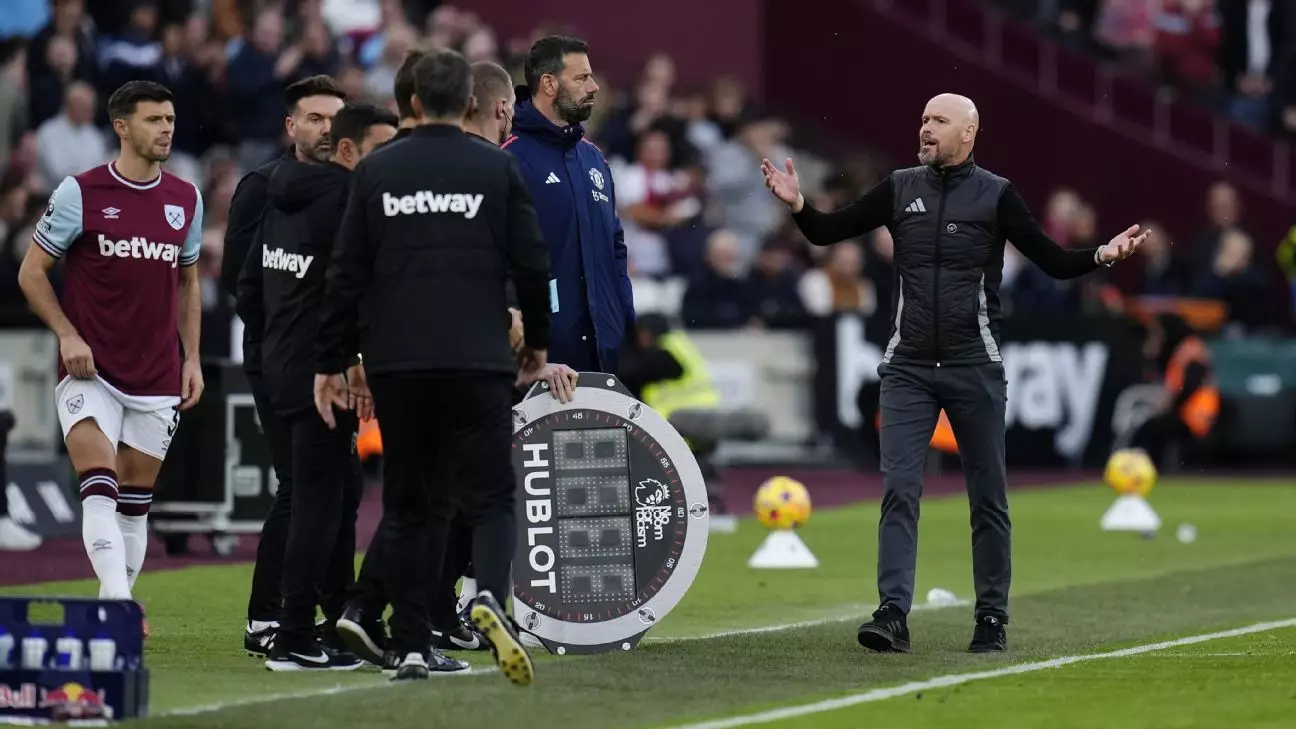In recent times, football has been gripped by debates that revolve around the use of technology, particularly the Video Assistant Referee (VAR). The latest match between Manchester United and West Ham United has once again thrust VAR into the spotlight, raising questions about its application and effectiveness. Erik ten Hag, the manager of Manchester United, voiced his dissatisfaction not only with the decision that cost his team a point but also with the underlying VAR process itself. This incident has opened up a broader discussion about the state of officiating in football and the expanded role of technology in what many consider an unpredictable sport.
The match, held at the London Stadium, culminated in a dramatic late-minute penalty awarded to West Ham after a controversial VAR review. While United appeared to have secured a draw, the slight contact between Matthijs de Ligt and Danny Ings led referee David Coote to point to the spot after consulting VAR official Michael Oliver. This moment was pivotal; Jarrod Bowen stepped up and converted the penalty, sealing a 2-1 victory for the home side. Ten Hag’s reaction was sharp, reflecting both a personal stake in the result and a growing unrest with the decision-making frameworks governing modern football.
The Dutch manager’s disappointment primarily centered on the concept of “clear and obvious” errors that should prompt VAR intervention. In his opinion, the situation did not meet these criteria, as the minimal contact between the players was marginal at best. By contesting the process, Ten Hag emphasized a crucial point: the expectations set before the season regarding VAR’s operation are not being met. His candid remarks highlighted a disconnect between the governing bodies’ communication and the on-field application of these rules during critical moments.
Critique of Refereeing Decisions
One of the noteworthy aspects of Ten Hag’s criticism was his assertion that the referees were inconsistent in their application of VAR. He pointed to a previous match against Tottenham Hotspur, where a possible critical decision involving Bruno Fernandes was overlooked. Such inconsistencies spark frustration among managers and players alike, as they undermine the credibility of officiating and lead to feelings of injustice on the pitch. Ten Hag, significantly cautious in his language, refrained from blaming individuals, focusing instead on the broader officiating framework that he feels is failing the players and the teams, which are understandably seeking fairness in competition.
Furthermore, Ten Hag raised questions about the decision-making process during matches. The time taken to arrive at pivotal calls—three minutes in this instance—illustrates a lack of decisiveness in high-pressure scenarios. For a sport that thrives on split-second decisions, prolonged deliberation can disrupt the natural flow of the game. Referees must be equipped not only with the technology but also with the authority to make definitive calls quickly, enabling them to manage matches effectively.
Despite the turmoil, Ten Hag urged not to overlook the positives his team exhibited on the pitch. Manchester United currently sits precariously in 14th place in the Premier League—a position that reflects both a troubling start and a series of unfortunate events, as he himself articulated. However, he emphasized resilience, drawing comparisons between the current season and last year when his team similarly faced a struggling patch before finding their footing.
Looking forward, Ten Hag’s focus is on his players tuning their performance. Upcoming matches, including a Carabao Cup fixture against Leicester City and a crucial Premier League match against Chelsea, provide opportunities for the team to put their talent on display. For United to salvage their season, they must harness the lessons learned from this VAR controversy and channel their frustrations positively into their upcoming performances.
The integration of VAR in football has undeniably transformed how the game is officiated. However, incidents like the one witnessed at the London Stadium underline the need for clarity, consistency, and decisiveness—qualities that are essential for maintaining the integrity of football. As Erik ten Hag and his team navigate a challenging season, the hope is for a more harmonious relationship between technology and traditional officiating practices, ultimately leading to a fairer playing field for all clubs involved. The road ahead may be fraught with difficulty, but it also promises the kind of drama that makes football compelling, raising the stakes not only for teams but for officials entrusted with the game’s integrity.

